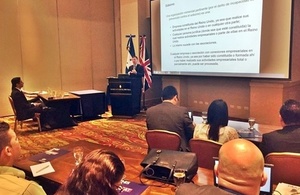United Kingdom and United Nations work together to tackle contraband in Honduras
High level officials from the Government of Honduras and members of the private sector participated in a seminar aimed at increasing their knowledge of policies and techniques used to combat illicit trade and contraband.

Capacitación en Honduras
The United Nations Office on Drugs and Crime - Regional Office for Central America and the Caribbean in Panama (UNODC-ROPAN) provided the training, with funding from the British Embassy, in the framework of supporting the Government of President Juan Orlando Hernandez in the areas of justice and state revenues.
Officials from the customs authority, ports, the directorate of judicial investigation and members of the private sector, amongst others, addressed specific themes, such as monitoring and identification of contraband routes; international codes for the handling of containers and facilitation of trade; and globally accepted mechanisms to tackle corruption and illegal activities.
The workshop also provided a space to explore the dimensions of illicit trade, taking into consideration its repercussions on the economy, society and the citizens of Honduras. Additionally, the participants exchanged valuable experiences with British specialists and UNODC officials.
To mark the UK’s involvement in this initiative, British Ambassador to Honduras, Carolyn Davidson, said:
We are very pleased to facilitate this event. The problem of contraband is felt both in the UK and in Honduras. Illicit trade is a problem with transnational consequences. These have a negative impact not only on trade regimes but also on health, and contribute to insecurity. Contraband affects everyone –and Governments lose millions of dollars in unpaid taxes, money that could be used in infrastructure projects, education, health, and poverty reduction. That’s why we must find common solutions to eradicate it.